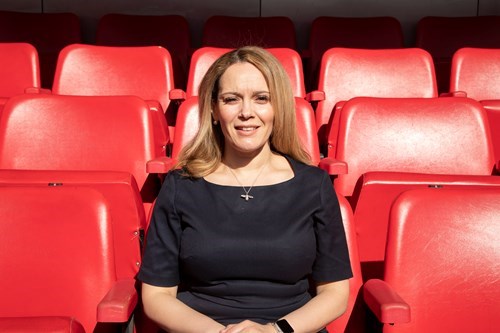Sarah Tudor, Director of Global Education and Experience at GIS, contributed to the SportBusiness Academic Insight Series on the future growth of the global sports industry in a post-Covid world. Here, we hear what she had to say on UCFB and GIS’ unique role within the sector…
The future is never written, and never has that been more evident than over the last 16 months. No industry has escaped this pandemic unscathed, and while we all continue to work out what the next six months will look like, never mind the next six years, what is true is that collaboration and insight will be one of the most important factors in determining the short and long term future of the global sports industry.

At UCFB and GIS, we put industry at the very heart of all our student experiences and new course development. Whether that’s work experience, business development, marketing, career development or knowledge sharing between leadership teams, our partnerships with the likes of The Football Association, Maple Leafs Sports & Entertainment and New York Red Bulls ensure students and staff are learning from and interacting with individuals and organisations who are leaders in their field. That includes the shaping of our undergraduate, Master’s and executive education programme content to ensure students develop the knowledge, skills and behaviours needed to support their own personal growth and the future development of the sports industry.
We firmly believe that such partnerships between the sports industry and education providers will drive the development of skills required to embrace new thinking and new models of working. The upskilling of students and graduates in the specifics of sport – whether business, management or commercial – can and will only benefit the industry in the years to come.
The financial impact of the COVID-19 crisis on the sports industry’s bottom line is no secret, and now many organisations are looking even more to ensure that their current and future staff have the required skills to be creative, innovative, adaptable and flexible. These skills will support the required transformation and continuous improvement to allow organisations to recover financially and adapt their business models to suit the post-Covid world.
At GIS, our Global Industry Advisory Board includes a network of experienced, senior executives from around the world. With each member representing a different sport, country, continent and unique skillset, their insight and contribution to the development of our programmes to meet industry needs and to respond to new demands, including emerging areas such as player care and fan engagement, ensures that what our practitioners are teaching and students are learning is never out of date and always relevant. In an industry as fast-moving and as demanding as ours, we believe this gives graduates a unique advantage when they enter the workplace and look to make their mark on the world.
Work placements are an important way to improve your employability & utilise your education before beginning a successful career. #KickOffYourCareer💥⚽️
— UCFB | GIS (@ucfb) June 12, 2021
Here are just some of the clubs, brands, events, and organisations our students have worked with! 👇
Globally, businesses are looking to their employees to continuously improve and use their networks to support recovery and unearth new opportunities that perhaps didn’t exist in a pre-pandemic environment. New learning opportunities enable the current and future workforce to confirm what they already know, develop their thinking and learn new ways of working to transform their practice.
Pat Riley, former NBA player, coach and now president of Miami Heat once said: “Excellence is the gradual result of always striving to do better.” Thanks to our partners in the UK and around the world, continuous learning provides the opportunity to ‘always do better’, and there can be no better way of learning than from those that are the market leaders who are forging a path for the next generation of talent to walk on and continue.
Here in the UK, it’s been recognised that that skills development will be key to any post-Covid economic recovery, and this was evident in the recent Queen’s Speech as part of the State Opening of Parliament. A promised ‘Lifetime Skills Guarantee’ in England with a ‘flexible loan’ for higher education training will mean a greater number of individuals keen to either upskill or restart their careers will soon be looking towards sport and the numerous opportunities it can provide.
When UCFB, and latterly GIS, was formed, it was never envisaged that we would be uniquely placed to support the sports industry recover from a global pandemic. But this is where we now all are, and it would be remiss of us to not shout about the future prospects of this unique, exciting sector and show the world that sport, and the business that surrounds it, will not be deterred.

















